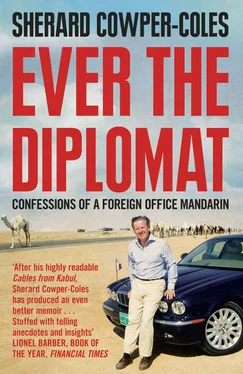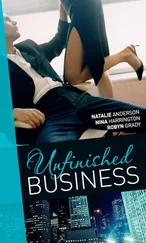Trevor had joined the Diplomatic Service late, as a retired major. He had had a succession of tough postings, culminating in Beirut as we closed the Embassy at the height of the Lebanese Civil War. The last telegram Trevor had received in Beirut before he smashed up the cipher machine with the hammer provided in every embassy for just that purpose had been ‘You are instructed to proceed with closing down the Embassy in accordance with Volume 12 of Diplomatic Service Procedure.’ His reply to London had been ‘DSP already incinerated. But shutting down any way. Signed Mound.’
Back in London, financial pressures, including multiple alimony payments, had obliged Trevor to let out his own house and live in the top floor of the Foreign Office building as a resident clerk. In return for a reasonably generous allowance, and a one-bedroom flat in SW1, with stunning views over St James’s Park, resident clerks were expected to man the phones – and monitor the overnight telegram traffic – one night a week, and one weekend in six. Trevor used often to invite me up to his eyrie after work, for gin and tonic and a gossip. He used his flat to entertain generously and widely. With that in mind, he had persuaded the Foreign Office Home Estates Department that his bad back – the result, he said, of an awkward parachute landing in Malaya – required that a double bed be installed in his bedroom in the Clerkery, at some expense, and even greater effort for the workmen obliged to propel the bed up the narrow staircase. Sometimes Trevor would invite his latest ‘lady friend’ (as he used to call them) and any other guests to climb, quite illegally, out of the window of the Clerkery, to enjoy a drink on the roof of the Foreign Office, as the sun went down behind Buckingham Palace at the other end of the Park.
Over those talks with Trevor, I learned much about diplomatic life. The Army had trained him as a Cantonese speaker, although, when the Foreign Office had subjected him to its language-aptitude test on joining, he had been judged incapable of learning any foreign language. But Trevor’s first diplomatic love was China, and it was in Shanghai that he and I would next meet, eight years later. Perhaps because of his Chinese, Trevor’s English handwriting resembled an exotic, almost cuneiform, script. His written expression was anyway economical in the extreme. At least decrypting his written comments in the margins of my drafts gave me a chance to see him and talk. Trevor offered several pieces of career advice. One was that, if you wanted to rise to the top of ‘the Office’ (as he always called it), spend as little time as possible in distant or dangerous postings. Colleagues in faraway embassies were soon forgotten, accidentally or deliberately. It was naive to think that the reward for a tough posting would be a plum one. The ambitious knew that walking the corridors in Whitehall or in the Brussels near-abroad did far more for one’s career than working the far bazaars of Asia, Africa or Latin America. It was advice that Trevor, with his love of China, did not himself follow. He ended his career, serenely happy, as consul-general in Marseilles, untroubled by the anxious ambition that ate away at so many others. Trevor showed that striving too hard in the Diplomatic Service did not always lead to the best postings. In fact, as he once observed on seeing a hopeless colleague sent to govern a balmy Caribbean island, ours was a good service in which to fail.
Another piece of Trevor’s advice I also followed only partially. Abroad, Trevor said, as the British representative, one had to cut a dash. That meant always wearing a hat, so as to stand out from the crowd of other diplomats.
None of his colleagues would have wanted to describe Trevor as lazy. But he didn’t believe in exerting more effort than was strictly necessary to get the job done. The time saved from this remarkable economy of effort was devoted to various good causes: lunch, an early drink after work, and, in the Office, the composition of limericks. One of the best celebrated the IRA ‘dirty protests’ in HM Prison Maze and the involvement of the Roman Catholic Primate of All Ireland, Cardinal Ó Fiaich (correctly pronounced O’Fee). One couplet had the Cardinal’s name rhyming with ‘dabbling in IRA muck’.
Trevor’s boss, and the Head of our little department, could hardly have been more different. Philip Mallet had been educated at Winchester and Balliol. He bore the burden of at least two immensely distinguished forebears in the public service: his father, Sir Victor Mallet, had ended his career as ambassador to Rome, while a cousin, Sir Louis Mallet, had served as permanent under secretary of state for India. He must have complained at having been obliged to accept a green young third secretary as his main desk officer. At first sight, Philip was Foreign Office premier grand cru. In my first week, he took me to lunch at his club in St James’s. I must have passed the test, because he later included me in the dinners he gave for foreign diplomats at his house in Chelsea. In the autumn, he would appear on Monday mornings with apples for us all from his orchards in Kent.
But, despite his ancestry, or perhaps because of it, Philip and the Office had never quite got on as they should have done. He was too well mannered to complain, but one could see that he had not had the promotion his talent deserved. I was too inexperienced to understand quite why: he worked hard, his judgement was good and his understanding of Irish issues profound. I suspect it was something to do with his manner, and perhaps self-confidence. He was particularly upset when an especially high-handed minute from the Foreign Secretary’s office landed on his desk. Usually, notes from the Foreign Secretary’s private secretaries were models of periphrastic circumlocution: ‘The Secretary of State was grateful for your advice, but wonders whether it would be possible to examine an alternative …’ But that wasn’t the style of the new young Foreign Secretary, Dr David Owen. The memorandum to Mallet read, rather brutally, something like: ‘The Secretary of State has seen your minute, and does not like this advice at all …’
In a sardonic way, Philip saw the funny side of it. After the Republic of Ireland Department, his final posting would be as high commissioner to Guyana. He said that his main contribution in Georgetown had been to redraft the post’s fire regulations.
Ireland’s unique position in Britain’s foreign relations made it a close to ideal subject on which to work while learning diplomacy by doing. Britain’s first colony, Ireland was now an independent state as well as a member of what was then known as the European Economic Community. We had a complicated bilateral relationship to manage, as well as the business of co-ordinating our approach to European issues, notably the Common Agricultural Policy. But everything was overshadowed by the problem of Northern Ireland, and the search for a solution following the breakdown of the Sunningdale process* in 1974.
The foundations of good diplomacy are honest reporting and clear analysis. Our Embassy in Dublin sent back a stream of reports, by telegram and, twice weekly, in the diplomatic bags carried by the Queen’s Messengers back and forth across the Irish Sea. The opening of the bag in London always brought a flood of letters from the Dublin Chancery (or political section), covering many different aspects of Irish politics, the Irish economy and Irish society. The Ambassador, Sir Robin Haydon, would send private letters, typed on blue Foreign Office airmail paper in the large typeface then reserved for ambassadors, reporting, often in amusing terms, his encounters with Irish ministers and senior officials. We read all the main Irish papers and magazines. I took the Irish Times each day, and came to love it. Once I was made a temporary Queen’s Messenger, with a special passport on a folded sheet of vellum, and sent to Dublin with the diplomatic bag. I was so proud to be sitting at the front of the BA flight, beside me the white canvas mailbag, on which was stencilled in black the legend ‘Her Britannic Majesty’s Diplomatic Service’.
Читать дальше












